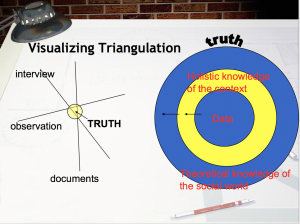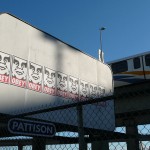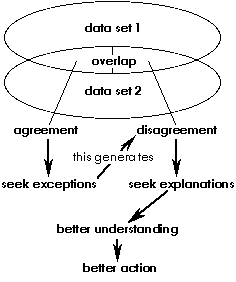All posts by Sandra Mathison
Embedded Scholars or Cultural Anthropology Returns to Its Colonial Days
The United States government has embedded anthropologists in troops in Iraq and Afghanistan to help them understand local culture. Does this amount to militarizing anthropology or anthropologizing the military? There is no end of controversy and many anthropologists see this as using anthropologists in counterinsurgency activities, as happened in Vietnam and Latin America. The NY Times has a story today on the matter.
Triangulation
A key strategy for establishing the veracity of interpretive/critical research is triangulation. The term is over-used and often mis-used. Many researchers imply that triangulation will lead to the truth by eliminating bias and is not based on the presumption that there is indeed a single truth to be gotten to (image on the left), but in reality the value of triangulation is more nuanced. Sometimes, data from different sources or collected by different methods do converge, but often they are inconsistent or even contradictory. Convergence is not more analytically useful (or closer to the truth) than inconsistence or contradiction. Triangulation provides the researcher with rich data from which to discern meaning, but this is a task for the researcher not an inevitable result of using a technique (image on the right). For a more thorough discussion of what this means and some examples, click on the article link below.
Virtual Ethnography
The increased use of virtual space as a cultural site for communication and social interaction opens a new space for social inquiry. The latest issue of the Forum: Qualitative Social Inquiry is devoted to this topic.
This peer reviewed journal is completely online and is truly international in its scope, indeed articles are available in several languages. You can subscribe to the journal and will get an email when each issue is published.
Ethnographic Case Studies
Here are links to the five elementary and middle school ethnographies that focus on the impact of state mandated testing on teaching and learning. In each case, one researcher spent a year doing participant observation with the team of 3 or 4 researchers involved in teacher, parent and administrator interviews.
Creating a Culture of Preparedness: One Suburban School’s Experiences with High-Stakes Testing
Hemlock’s Stand: One Urban Elementary School’s Efforts to Raise Test Scores
Doing the Best on the Tests: A Suburban Elementary School’s Response to High Stakes Test
Everyone Has an Epistemological Project
Here is one of the Shepard Fairey statements currently cropping up around Vancouver (unfortunately the masterful superimposing of obey the giant over the MacDonalds billboard was gone by the time I got back to take a picture). I would describe his work as phenomenological as the appearance of obey in unlikely places challenges the taken for granted with an emphasis on disrupting images of capitalism, globalism and neo-liberalism. In this picture there is a blank billboard, but the juxtoposition with the Pattison sign is enough in and of itself.
Essence of Grounded Theory
A Very Crude & Brief Overview of Some Major Methodologies
Marxism, dialectics, and critical social science
An excellent resource to explore Marxist perspectives is Bertell Ollman’s website. Lots of his publications can be found that, as well as links, and his scholarship is engaging and high quality. You will see a link to his book Dance of the Dialectics ~ the dance steps are below. So, when you need a refresher on dialectical thinking get up out of your chair, do the dance of the dialectics and then get on with your intellectual project.
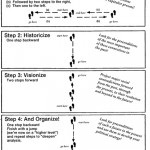
For a more general treatment of what it means to do critical social science, take a look at Brian Fay’s Critical Social Science. This book may be out of print but can easily be found in the library or through booksellers.
Modern Philosophy from the Time of Kant
A little detailed but worth taking a look at, especially to see that the various philosophical traditions that underlie contemporary educational inquiry developed across about the same historical time frame. Too often positivism, interpretivism and critical approaches to inquiry are presented as if their were an evolution from one to the next. Each of these traditions has evolved over the past two hundred plus years and although the ideas of Comte, Husserl, and Marx live on in our contemporary orientations to inquiry their ideas are not static and we continually reinterpret them in the present.
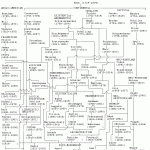
 Follow
Follow

